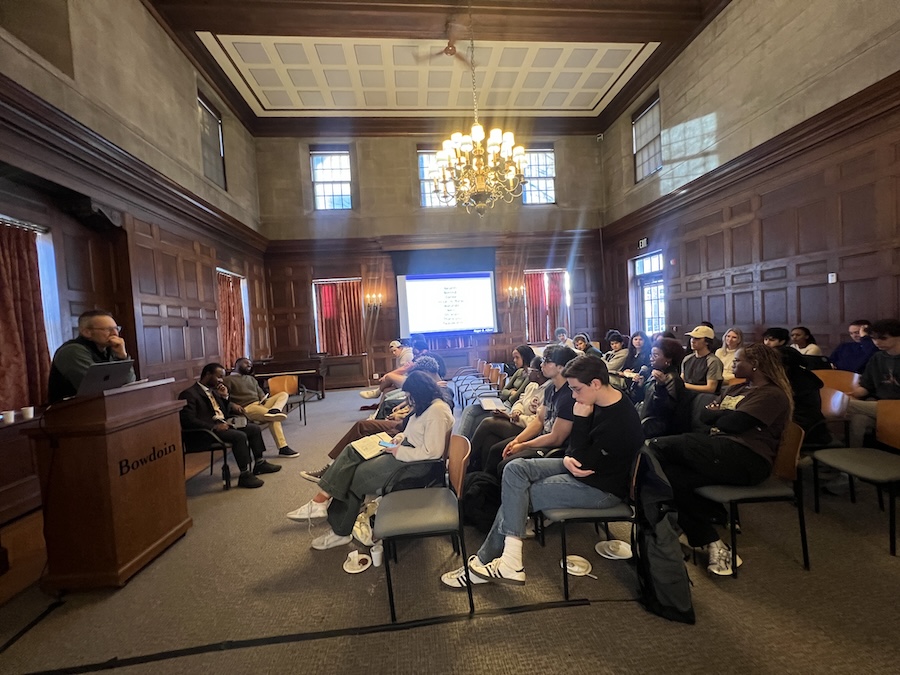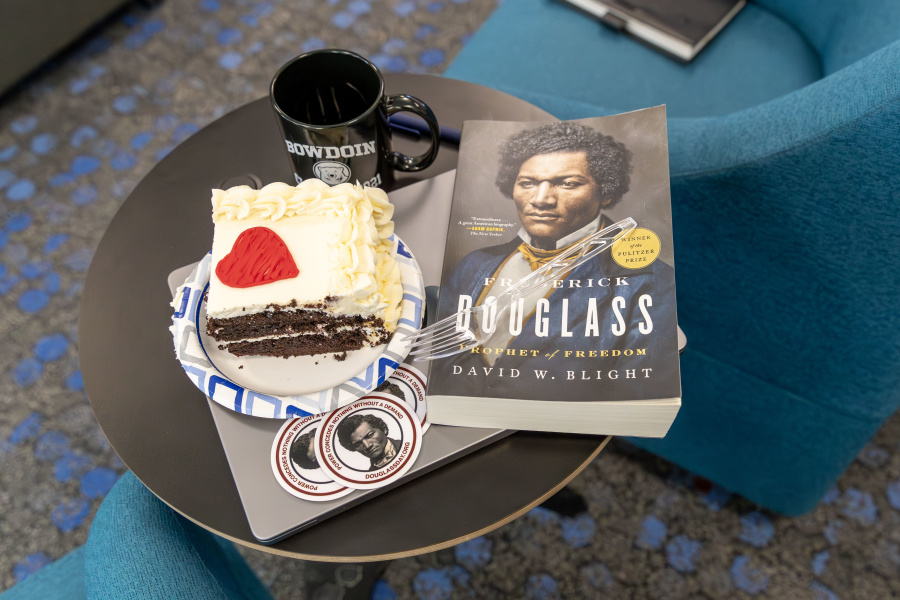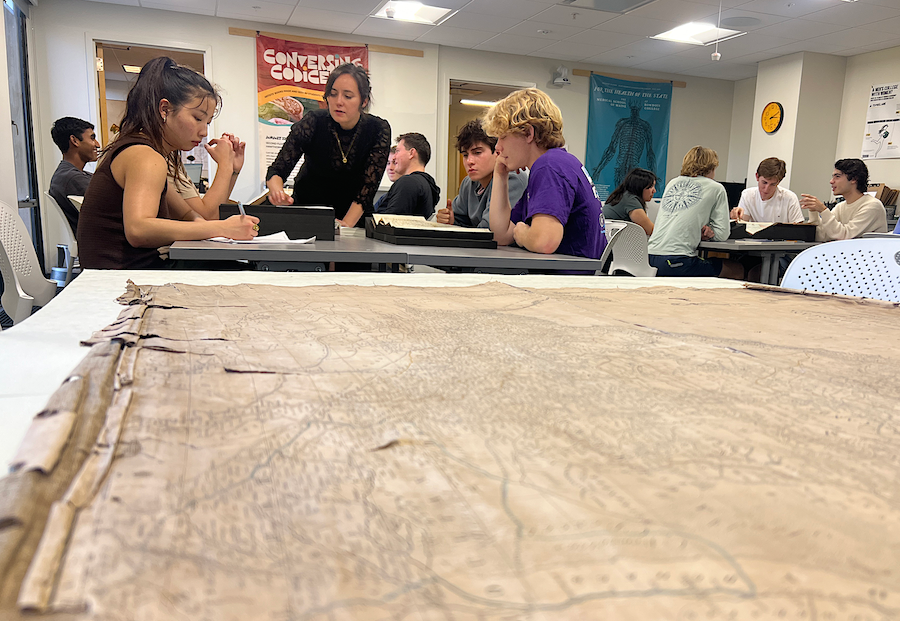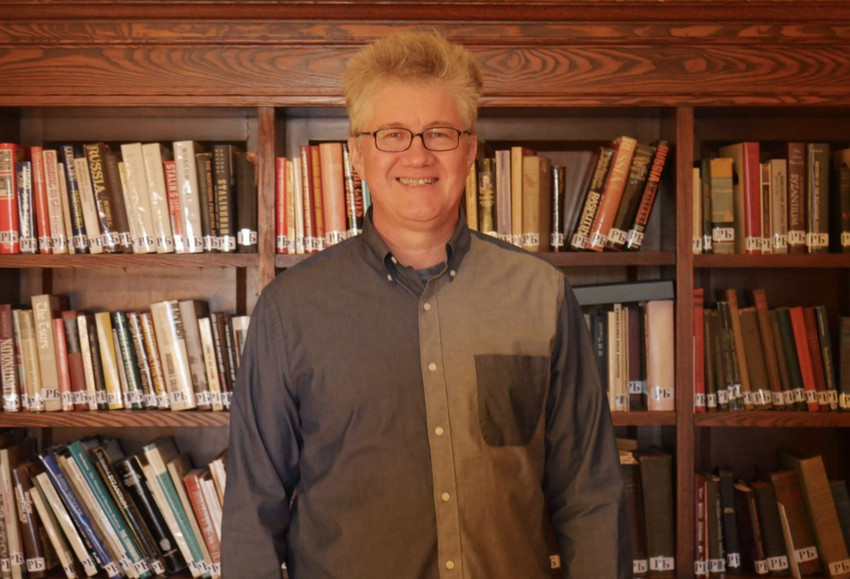First "1619" History Event Draws Hundreds of Viewers
By Rebecca Goldfine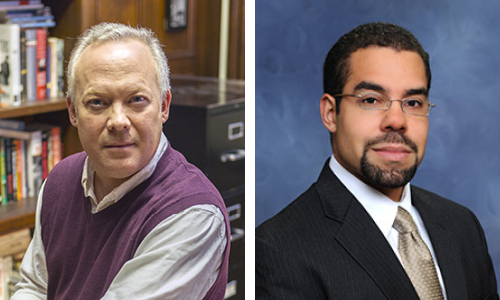
More than 450 people tuned into a Zoom webinar on Friday, September 11, called "One Nation? America's Origins and Slavery's Unfinished Past."
It was the first of four online events organized this fall by history faculty to analyze and share their interpretations of "this current moment of racial reckoning, with help from 'The 1619 Project,'" as Meghan Roberts, associate professor of history, explained it.
"The 1619 Project" reframes "the country's history by placing the consequences of slavery and the contributions of Black Americans at the very center of our national narrative," according to the magazine.
Roberts moderated the conversation between Purnell, who is Bowdoin's Geoffrey Canada Associate Professor of Africana Studies and History, and Professor of History Rael. Both professors study African American history, with Rael focusing on the Civil War era and the history of slavery and emancipation and Purnell on urban history, civil rights, and the Black power movement.
In response to queries posed in the chat room by faculty, staff, and students, Purnell and Rael discussed the merits and downfalls of the NYT's ambitious series and its implications for journalism, history, education, and public discourse. "The 1619 Project" has been criticized by some historians for "slippages of fact and interpretation" and "provocative one-liners," Purnell said, and by some right-wing commentators for being anti-American, according to Rael.
The professors explored these critiques by highlighting and explicating some of the key claims made in the three articles they focused on, by writers Nikole Hannah-Jones, Matthew Desmond, and Khalil Gibran Muhammad. (Each of the discussions in Bowdoin's event series will look at three to four articles published by the NYT's "1619 Project." You can see each segment's assigned articles and a related research guide here. The next event will be held Friday, Sept. 25, at 4:00 p.m.)
While they spent some time on the statements in the essays that have generated the most controversy, Purnell and Rael also noted an important theme in the series that they felt was overlooked: African American patriotism, especially in the introduction piece by Hannah-Jones. "She's talking about her father, and she's marveling at his willingness to keep being American, and wanting to be American, and striving to be American," Rael said. "That is an old theme."
And they spoke about the contributions Black Americans have made throughout US history to strengthening the ideals on which our country is founded. It is significant that the country's greatest believers in democracy are often those who have been denied it—and that their efforts to claim democratic rights and freedoms are what enliven our sense of them.
"Nobody talks about this line (from Hannah-Jones): 'What if America understood finally, in its 400th year, that we [Black people] have never been the problem," Purnell said. "What if America understood that Black people actually could be the solution for a more democratic, freer, more egalitarian, and more just country, one predicated upon principles of liberty, justice, and individualism?"
Below is a sample of quotes from Purnell and Rael from the event:
The value of "The 1619 Project" and its take on history:
Rael: "Because of contemporary events and the public's interest in contemporary events around Black Lives Matter and questions of equality and inequality, the history has taken on a new salience. People are interested in understanding the origin of these modern problems, especially when we talk about systemic racism...This is a remarkable moment and one that must be capitalized on when the public has its attention turned to these issues."
Purnell: "I think the purpose of the project is to try to yell at the top of its lungs that race and racism are pervasive, systemic, and everywhere...It is trying to put forward this powerful idea that the writers and the publication wanted Americans to think about."
Protesting, from defying slavery to Black Lives Matter:
Rael: "Resistance is the common thread, whether it's [an enslaved person's] day-to-day resistance—breaking tools, feigning ignorance, or pretending to be sick—to moving up the scale: to stealing yourself—running away—fleeing with your own body as capital...What the enslaved did was critical: Without them registering a persistent rejection of slavery in their status, nothing would have been possible, no freedom would have been possible. That is the sine qua non, without which nothing."
Purnell: "The Black Lives Matter movement is an attempt to bring criminal justice reform to the US. If the nation took up criminal justice reform in a comprehensive way...the reforms would not only benefit Black people, they would benefit any or all Americans, especially poor Americans who became ensnared in the criminal justice system. Furthermore, if people, instead of reacting so viscerally and violently against the movement—if people took its calls for criminal justice reform seriously—it could be a big political tent that brings together fiscal conservatives who want to stop overspending on prison construction, libertarians who want to see the legalization of controlled substances, and moderate democrats who want to see less systemic racism in one of the more important institutions in our civic life…There is a way that Black lives matter if we can focus on some of the policy ideas that the movement is calling for."
"Black Lives Matter is a simple idea. Black lives matter. When people say "Black lives matter," I wish Americans would say, 'Yes, they do.' Instead, there is somehow an idea that if Black lives matter, and if that is a policy platform, then it means other people’s lives don’t matter. And that is particularly destructive."
Does "anti-Black racism run in the very DNA of this country," as Nicole Hannah-Jones writes?
Purnell: "I think that it is the wrong metaphor to use if we’re trying to think about race and racism from a perspective of change over time. It's not that anti-Black racism is in our national DNA, I would argue, but that it's more that anti-Black racism serves very particular political, economic, and cultural functions at different times and in different ways. And then people continue to make and remake them to serve their ends in different ways over time. I don’t know what the metaphor for that would be. And I wouldn’t want to reduce it to a metaphor. But [Hannah-Jones's comment] is provocative and powerful and in your face; it is meant to get a reaction and a response and to get people to think after reading the pieces. As a useful way to think about history, it's not the best metaphor. But as a way to jar people into asking tough questions about the nation, it's effective."
Rael: "For me, the DNA metaphor misses the ambiguity of our founding and the ambiguity of race and the place of African Americans, in particular, in that founding. [The word 'slavery' didn't appear in the Constitution until the ratification of the 13th Amendment in 1865.] The founding fathers were ambiguous about the question of slavery and race. If it was written into our DNA, I doubt we would have seen the founders wrestling with the issue in the way that they did. [Because] at the same time as they're penning the words 'All men are created equal,' they're holding human beings as property. One could say that they were just hypocrites or didn't mean their words, but they did mean their words in some fashion, and they understood and recognized their hypocrisy...In the founding document of the country, the rules we play by, they acknowledge slavery without ever affirmatively stating that it was legal. That is the kind of ambiguity that has beset all of our history."
How can we continue the momentum of the Black Lives Matter protests?
Rael: "There are very few instances in American history where major progress has been made toward racial equality simply out of benevolence. There are always interests involved, and some of the work of activists is to help people understand how their interest is implicated in achieving a more racially just society. Right now, a lot of white folks in rural America who are not particularly well-to-do might have concerns about immigration, about Black and brown people coming from overseas. But those are your potential fellows, your potential allies. Those equations can be made, that we're all better off together. If the government has a stake in promoting racial equality, and the economy has a stake in creating better, more effective consumers—more productive workers who are not living at or below minimum wage who might be able to contribute to the economy through consumption—these are arguments that can be made and leveraged so that it becomes a more natural interest for non-African Americans, non-Black people, to participate in the project of achieving racial equality."
Purnell: "I want to speak to our students about how you can continue the momentum. First, as an individual, for all of us, consider what kind of country do you want? Do we want a country, for example, where we have a global pandemic in which...so many people have died? And we have disconnected communication between local, state, and federal government? Do we want a country like that? Or do we want a country where we can solve problems in common that affect us commonly?"
"And the second thing I would say to students is, stay at the table. If you're trying to work through issues and questions, and somebody makes a mistake or says something you don’t agree with or which offends you, you can get angry and frustrated, and you can even blow up. But maybe come back, maybe try to continue the conversation in another way. Not to subject yourself to torture, but because you are invested in trying to work through forming relationships with people around issues you care about. And not everyone is going to get it right all the time. If you're going to try to push a political agenda, it has to involve more than people who think just like you and more than people who are pure or perfect."
